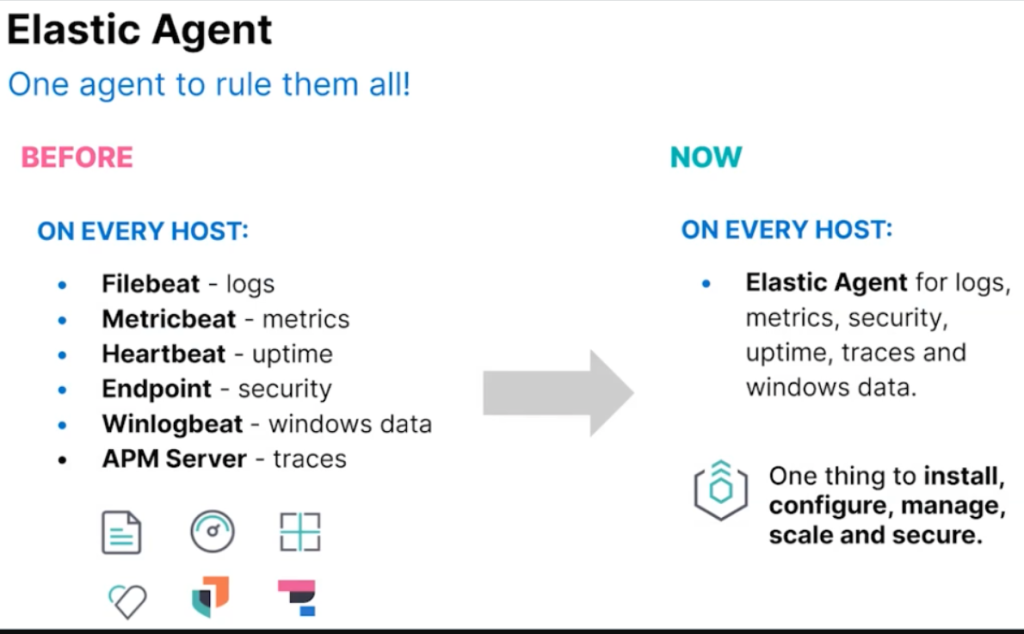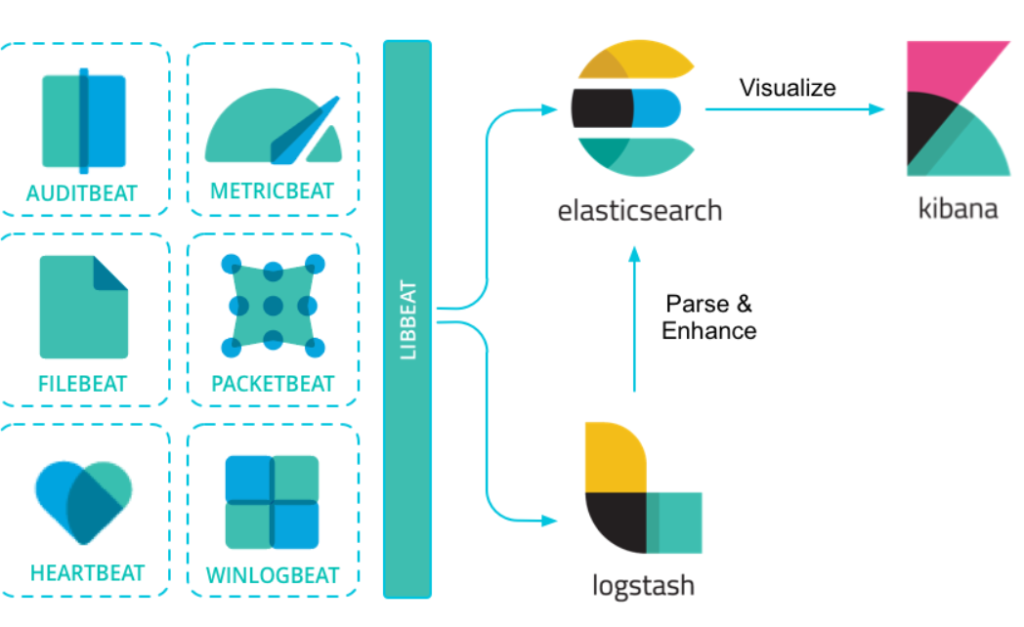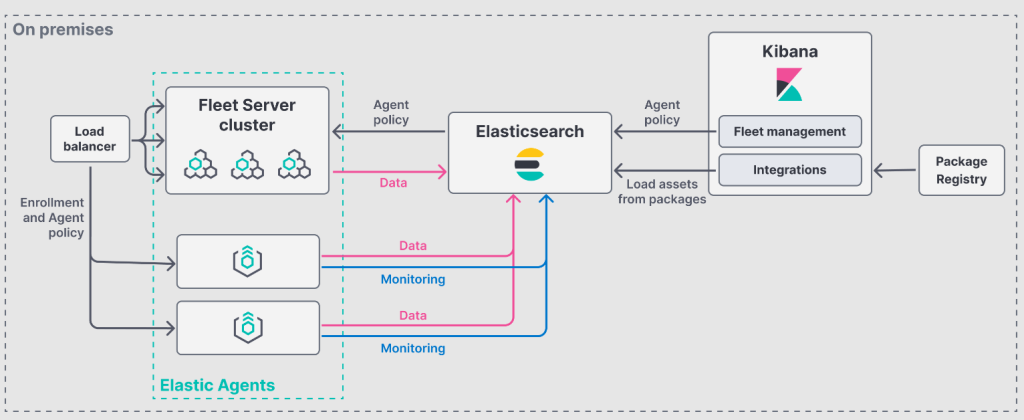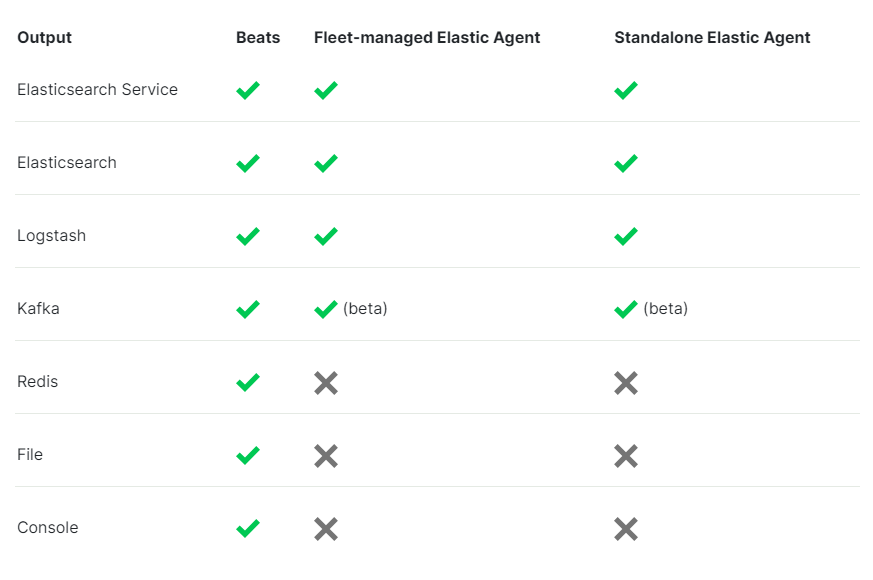
Beats and Elastic Agent are both data shippers used within the Elastic Stack, a set of tools for searching, analyzing, and visualizing log data in real time. They play crucial roles in data ingestion but differ significantly in their capabilities and use cases. Here’s a breakdown of the main differences:
Elastic provides two main ways to send data to Elasticsearch:
- Beats are lightweight data shippers that send operational data to Elasticsearch. Elastic provides separate Beats for different types of data, such as logs, metrics, and uptime. Depending on what data you want to collect, you may need to install multiple shippers on a single host.
- Elastic Agent is a single agent for logs, metrics, security data, and threat prevention. The Elastic Agent can be deployed in two different modes:
- Managed by Fleet — The Elastic Agent policies and lifecycle are centrally managed by the Fleet app in Kibana. The Integrations app also lets you centrally add integrations with other popular services and systems. This is the recommended option for most users.
- Standalone mode — All policies are applied to the Elastic Agent manually as a YAML file. This is intended for more advanced users.
Beats
- Singular Purpose: Beats are lightweight, single-purpose data shippers for various types of data such as logs (Filebeat), network data (Packetbeat), metrics (Metricbeat), and more. Each Beat is designed to do one thing well.
- Flexibility: Users can deploy multiple Beats for different data types, providing flexibility in how they collect and forward data to Elasticsearch or Logstash.
- Simplicity: Being focused on specific tasks, Beats are easier to configure and manage for their particular use case. This simplicity can be beneficial in straightforward data collection scenarios.
Elastic Agent
- Unified Agent: Elastic Agent is a more comprehensive solution designed to manage multiple data integrations from a single agent. This approach simplifies the deployment and management of data collection across your infrastructure.
- Fleet Management: Elastic Agent is centrally managed by Fleet, a feature in Kibana that allows users to configure and monitor agents from a web interface. This central management capability significantly eases the complexity of managing large-scale deployments.
- Integrated Security: Beyond data collection, Elastic Agent can also run Endpoint Security, integrating data collection with security features. This makes it an excellent choice for environments where security and observability are closely aligned.
- Versatility: Elastic Agent supports the capabilities of several Beats by using them under the hood, making it a versatile tool for collecting different data types through a single agent.
Summary
- Use Case Specificity: Choose Beats if you need a lightweight, specialized tool for shipping specific types of data. They are particularly useful when you only need to collect one type of data or when minimal resource consumption is critical.
- Comprehensive Data Collection and Management: Elastic Agent is better suited for scenarios where you need a unified tool to manage various data types and want the convenience of central management through Fleet. It’s also the go-to choice for environments that benefit from integrated security features.
Functionality:
- Beats: Lightweight data shippers designed to collect specific types of data, like logs (Filebeat), system metrics (Metricbeat), or APM data (Elastic APM). You may need to install multiple Beats on a single host to collect different data types.
- Elastic Agent: A single agent that can collect logs, metrics, security data, and even enable threat prevention. It acts as a more unified approach.
Management:
- Beats: Traditionally configured with YAML files on each individual host. Management can be cumbersome, especially at scale.
- Elastic Agent: Can be managed centrally through Fleet, a part of Kibana. Fleet allows you to define configuration policies and deploy them to multiple agents, simplifying management.
Other Considerations:
- Beats: Generally simpler and more lightweight, making them a good choice for resource-constrained environments.
- Elastic Agent: Offers more flexibility with variables and conditional logic in its configuration.
Beats Architecture

Elastic Agent Architecture

Supported outputs


Latest posts by Rajesh Kumar (see all)
- What is Mobile Virtual Network Operator? - April 18, 2024
- What is Solr? - April 17, 2024
- Difference between UBUNTU and UBUNTU PRO - April 17, 2024

